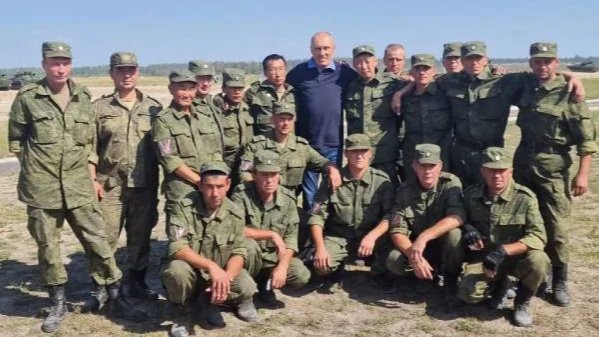Before Vladimir Putin’s “partial mobilisation” was announced, authorities in various regions across Russia — especially in the ethnic republics — created battalions recruiting “volunteers” and promising them large payouts. One such outfit was the Baikal battalion which was to consist of the residents of the Siberian region of Buryatia. However, according to Novaya Gazeta. Europe’s sources, the recruitment effort fell through: ads circulated on all local pro-Kremlin media and blogs showed that only a few dozen people showed up. The regional authorities say that the battalion’s command staff has been fully recruited, but there remains “a need for soldiers to form the unit”.
After they were sent to the front line, no official news about the battalion’s condition has been published, and the fate of the “volunteers” is known to their relatives through scraps of information and rumours. Some families have been unable to contact their relatives in the battalion since late September, and the regional authorities remain silent.
Novaya Gazeta. Europe found out that most of the battalion’s troops died on 28 September during the battle for the village of Petropavlivka in the Kharkiv region of Ukraine, which the Ukrainian President Volodymyr Zelenskyy said had recently been liberated. We spoke to the Baikal battalion’s relatives.
‘Is that something to die for?’
Elena B. has not been able to get in touch with her husband Kirill since 26 September [name changed at the request of the interviewee — editor’s note]. Kirill is 45 years old, and he had no links to any law enforcement agency before the way. He served in the army 23 years ago and since then, according to Elena, he has never held a gun in his hands and worked in construction.
“This year has been difficult for our family: [we have] three children, and my husband lost his job. I can’t say we were particularly interested in politics. When the ‘special military operation’ started we didn’t understand what it was. Well, yes, there were Nazis somewhere, but what did we care? We never understood it at all. Then my husband lost his job, I have no money, I’m on maternity leave, I have to pay the rent somehow. In the ‘Buryatia Online’ group, I think, my husband found this announcement about recruitment for the Baikal battalion. We discussed it for a long time: the payments there were big, they also wrote that they would help our children with their studies, and our eldest daughter was about to enrol [in university] and there was no guarantee that she would get a scholarship, and so he decided to volunteer,” Elena recalls.
According to the woman, it was a forced decision, and “if it we weren’t tight on money,” Kirill wouldn’t have gone to Ukraine:
“I told him: ‘since you’re in this, just try and sit in your tank somehow, don’t kill anyone. Just sit tight and take care of yourself — the kids still need you”.
Since being sent to the front line, Kirill tried to call his wife regularly — he only had a push-button phone with him.
“He didn’t give any details: what they were doing, or where they were. He would just say that everything was fine and tell me not to worry. Sometimes, really, I don’t know how to put it... Well, he would give up, say he was scared, that he wanted to come back,” the woman says.
The last time Kirill called her — on the morning of 26 September — he said that there were “difficulties” and he didn’t know the next time he would be able to get in touch. Elena had heard rumours, which are now spreading throughout Buryatia, that the battalion had been attacked near Donetsk, and almost all of its members had been killed.
“I heard it from a neighbour. She says: ‘Elena, have you heard? That’s where your husband is right now. Is he all right?”. And at that moment the ground fell out from under my feet. I called our administration — they either told me to go elsewhere, or said that everything was ok, or that there was no news and they didn’t know anything. On the one hand, I want to know what happened to my husband, but on the other hand I’m scared. If a death notice doesn’t come, maybe he’s still alive? Maybe he was taken prisoner or is lying wounded somewhere? I don’t want to become a widow at the age of 40 and I don’t want my children to be orphans, I just want my husband back. Hope springs eternal.”
Irina Zvyagintseva, 39, of Ulan-Ude, published a post on VK on 6 October, calling to raise money for the Baikal battalion:
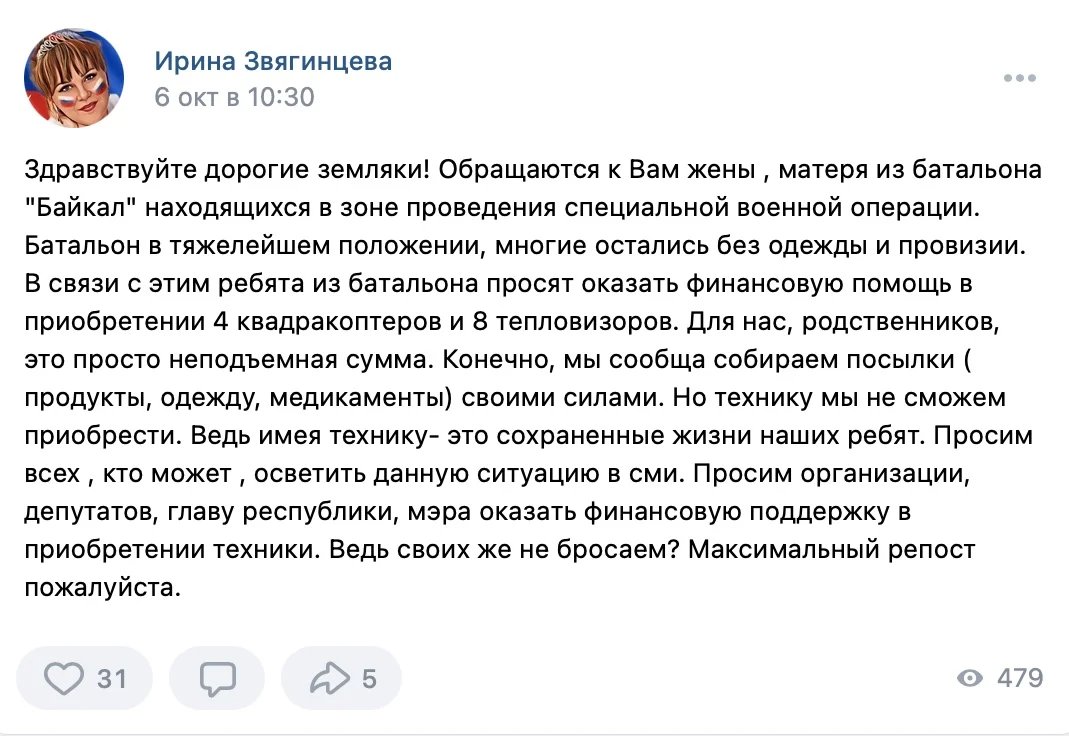
The post calling to raise money for the Baikal battalion. Source: VK
Irina Zvyagintseva responded to a message from Novaya Gazeta. Europe’s correspondent, saying she had relatives serving in the battalion: “My husband was in touch today [on 11 October], and my nephew died. I’m talking about the 2nd and 3rd company”.
The first thing Irina says during the interview is that after the post was published, the head of the Buryat Republic, Alexey Tsydenov, ordered that the battalion be fully clothed, issued the necessary equipment, and “things started to move forward, more or less”.
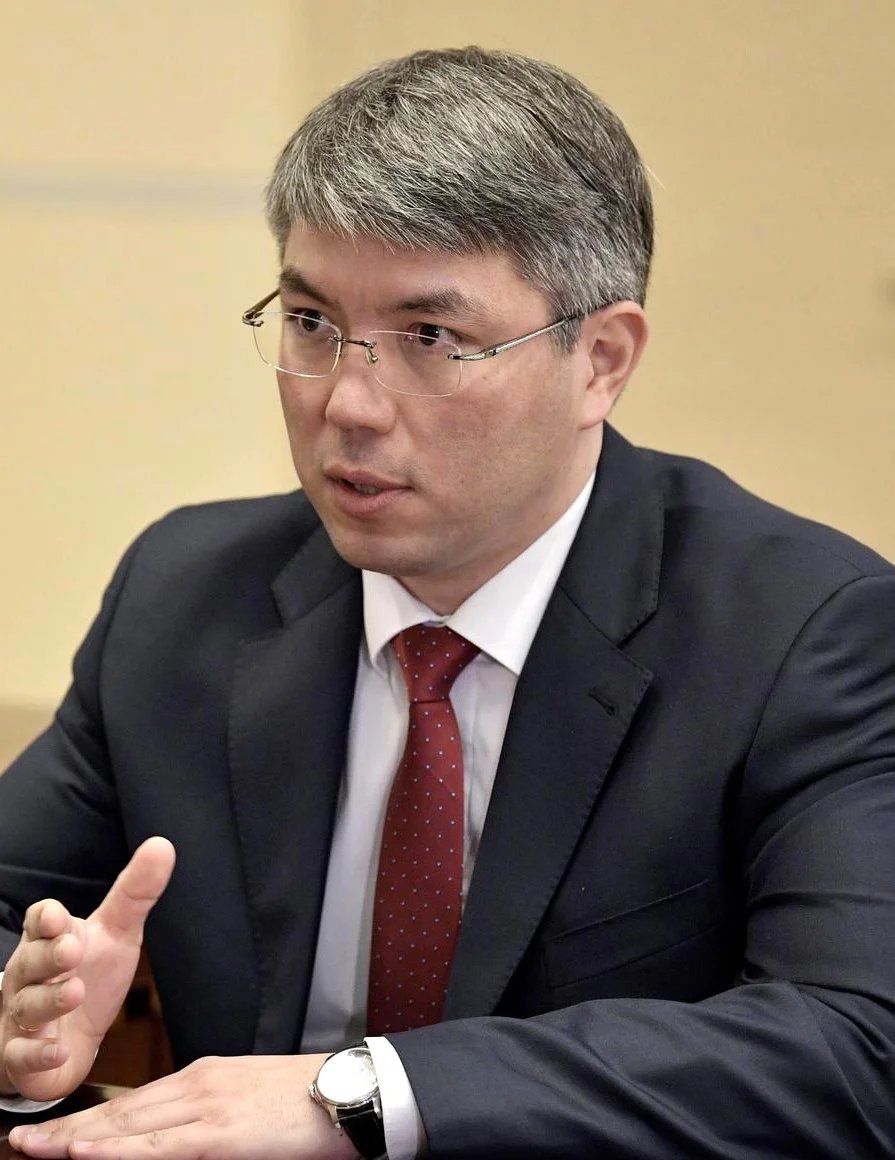
Alexey Tsydenov. Photo: Wikimedia Commons, Kremlin.ru, CC BY 4.0
Irina’s “husband” is actually her ex-husband Timofey, a 40-year-old man whose surname was withheld at her request and with whom she has a 19-year-old son. Timofey and Irina had been married for 16 years. According to the woman, they have “a very good and warm relationship, it’s a part of life that can’t be erased or thrown away.” Irina is waiting for him to return from the war, while Timofey helps Irina and her mother. Before the war, Timofey worked in law enforcement, serving under contract at the Divizionnaya station of the East Siberian Railway — part of the Trans-Siberian Railway. Timofey become a “civilian” once his contract was up, says Irina.
Timofey, like Irina’s nephew Viktor Viktorov, 31, joined the Baikal battalion covertly, without discussing it with relatives and friends. Both men became volunteers back in the summer — their families only found out when they left for military training.
“Everything is fine with them, my husband calls me from time to time, everything is fine,” Irina begins her story during the phone interview. After a short pause, she adds:
“They were crushed in Petropavlivka, my nephew died, he burnt to death in a tank, a mine fell from a drone on 28 September. Our guys who were there on the 28th, I don’t know how many came in, but very few came out, [Ukraine] crushed them badly. They were driving two IFVs and they took the hit. [Irina starts to cry as she talks about it — editor’s note.] They saved 39 people.
The thing is that the machinery is on Ukrainian territory, they can’t pull them out to at least bury what’s left of the dead. We want them to be awarded posthumously.
They took the fire, diverting it so that our boys, who were left behind, could take the wounded from the battlefield. Of course, they had to retreat, because the forces were unequal, [the Ukrainian] outnumbered them. It was the Buryat Baikal battalion, and the dead were mostly guys from Buryatia. It was the Baikal battalion that was there. My husband said it was just a meat grinder, as if the devil had descended from the skies above. My husband says he learned to pray for the first time. He was a non-believer, he said he had already said goodbye to everyone. There were a lot of wounded, he said, he wished there were more tourniquets. He said that a guy had both his legs blown off, and said that while he was applying a tourniquet on one of them, a silent mine was dropped from a drone, and all the ‘300s’ next to him turned into ‘200s’. (300 is Russian military code for the wounded, while 200 is code for the dead — translator’s note). The wave knocked him back. His hair must’ve gone grey, he said, and he was just carried out, as my legs weren’t moving and he had no strength.”
According to Irina, Timofey wasn’t wounded, but he would not tell her where he was now and how many of the battalion were left, as they were commanded not to. Asked whether the man plans to return after that, Irina answers that she doesn’t know: “But he said: I won’t leave my guys, I’ll be here till the end. He also said, verbatim: ‘I’m going to throw that fucking TV away when I get back’. He said that only 10% of [what they say on the TV] was the truth. He went there saying that he was a patriot and that he was going to protect people.”
Irina’s nephew Viktor Viktorov, who died in a tank during the fighting in the village of Petropavlivka, had no family of his own — he was survived by his elderly parents.
“Viktor has no wife, no child, he didn’t have time for anything. His parents don’t know [that he died] yet, we haven’t told them, we’re afraid, we’ll wait for the official notice, if there is one. But they won’t be notified yet, because [the destroyed machinery] is in Ukrainian-controlled territory, and if they manage to get the bodies, they’ll have to do DNA [testing], if there is anything left of them — and only then will they give us a death certificate. It’s the same with us: no body — no case. Yesterday, when my husband called, he sent me a video of them being crushed. He said you can even see the number plate of the car Viktor was in. I must’ve been crying my eyes out, I couldn’t see anything. I sent a request to [Buryat Republic Head] Tsydenov for help, to help him get his rank,” says Irina.
The woman sent Novaya Gazeta. Europe a WhatsApp video with smudged emblems of the Ukrainian unit Beshketniki Sirka, which shows Russian equipment being destroyed. Novaya Gazeta. Europe found the same video on the “Ukrainian Military YouTube” channel with the title “Destruction of Russian BMP-2M in Petropavlivka village”, which was published on 10 October.
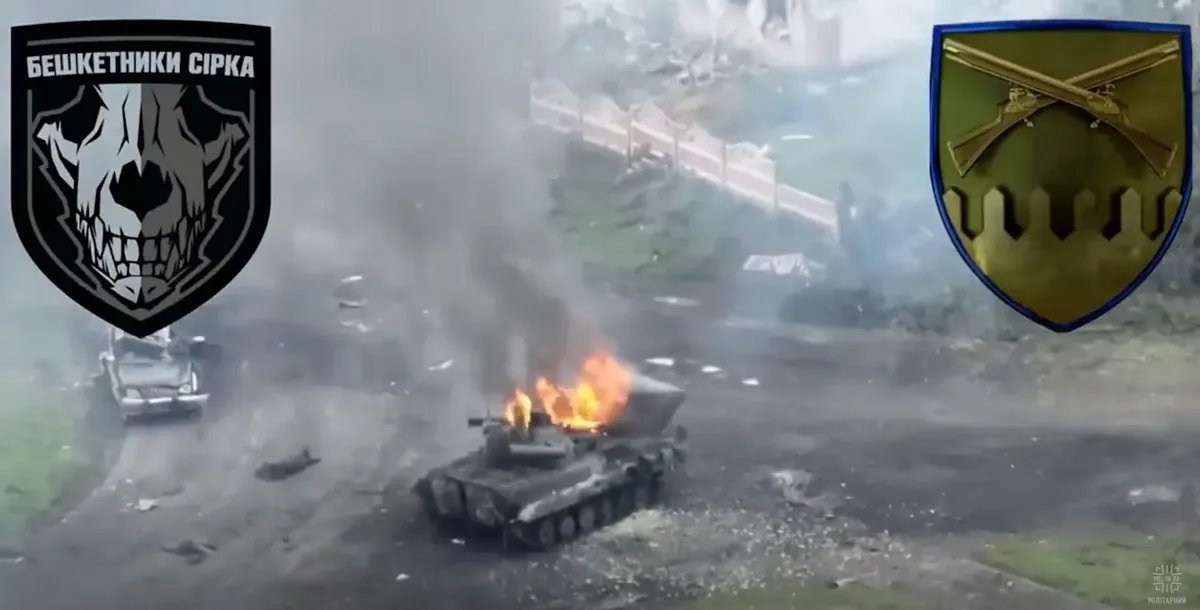
Photo: video screenshot
“The Ukrainian military destroying Russian military armoured vehicles during a counter-offensive in the Kharkiv region. Soldiers of the 92nd Mechanised Brigade named after Ivan Sirko showed their work. Near the village of Petropavlivka, near Kupyansk, a reconnaissance unit of the 92nd Brigade trapped a Russian BMP-2M. The Russian 3rd Army Corps armoured vehicle was stopped at a street intersection, where it was shelled and bombarded with drones,” the video description reads.
“The government’s not giving us anything. It is getting ridiculous: I went to collect Viktor’s salary today, I took 37,200 roubles (approximately €609). Is that something to die for?” — Iryna finishes the conversation with these words.
Novaya Gazeta. Europe found Viktor’s social media account — the last time he went online was on 24 September.
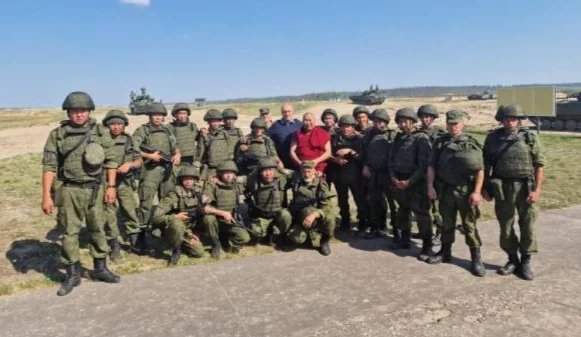
Photo: Baikal Daily
What is the Baikal Battalion?
On 27 July, regional Buryat newspaper Gazeta Nomer Odin (“Newspaper Number One” — translator’s note) announced that the Baikal battalion was being formed to be sent to Ukraine. “Those who join it are promised all sorts of bonuses,” reads the article’s subtitle. The man behind the article, Konstantin Voronov, writes that the command staff has already been formed, along with the main part of the unit.
“Military service under contract is a worthy choice of a real man, a real protector. I’d like to point out that all soldiers entering military service will be provided not only with the social benefits and guarantees established by current law, but also with additional guarantees as decided by the government of the Republic of Buryatia. In accordance with the decree of the Government of the Republic of Buryatia dated 13 July, 2022, a lump-sum payment of 100 thousand roubles (approximately €1642) to the citizens entering the military service under the contract is already fulfilled. First of all, this payment is provided to servicemen under the contract of the Baikal military unit”, —the newspaper cited the words of Pyotr Mordovsky, Deputy Prime Minister of Buryatia in charge of the issues related to the battalion.
The article noted that those willing to join the military service under a contract to Baikal can apply to military registration and enlistment offices according to their place of residence. The list of requirements includes good health, at least secondary education and no criminal record. The list also contains the “privileges” which the surviving volunteers will be given: a lump-sum payment of 100,000 roubles (approximately €1642), free transportation to a holiday destination, free spa treatment, free medical treatment in military hospitals and clinics of the Defense Ministry, and benefits for families of soldiers who have taken part in the special operation in Ukraine, as well as for enrolment in kindergartens and institutes of higher education in Buryatia.
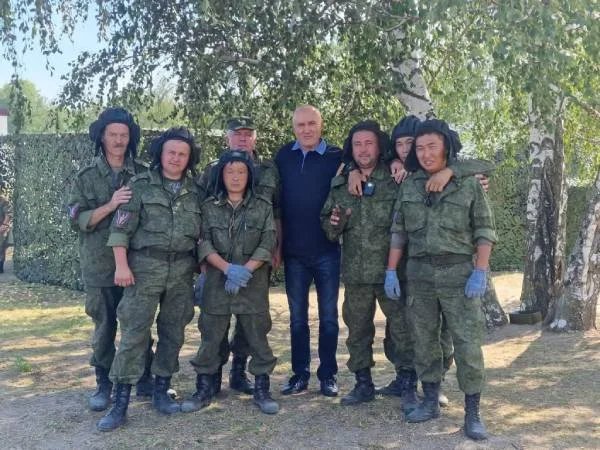
Photo: Baikal Daily
Since July, announcements about recruitment for the battalion have been published once a week in pro-government regional media channels. Volunteer recruitment has been “upgraded” — it is now possible to sign up for the battalion at public services centres, military enlistment offices and village administrations.
“The Baikal battalion is a motorised reserve unit. It’s needed in order to give the people that are currently taking part in the special military operation as part of the Army an opportunity to rest. The squad is being manned with modern equipment, and is almost assembled,” claimed Nikolai Kapinos, head of the military commissariat of Buryatia for the Oktyabrsky district.
The battalion received military training in Mulino in the Nizhny Novgorod Region where the Third Army Corps, Russia’s operational and tactical ground forces, had been formed from regional volunteer battalions.
In pictures published by Baikal battalion members taken in Mulino, only about 20 people can be seen, and ethnic Buryats appear to be a minority. In a story published on 5 September, Baikal Daily quotes Nikolai Kapinos as saying the battalion needs to hire another 200 people, which allegedly accounts for 30% of Baikal’s total command staff. A Noyava Gazeta. Europe source has said that other volunteers from the Third Army Corps may have possibly been recruited to the battalion in Mulino due to the shortage of volunteers from Buryatia. This was the case with the Chechen Akhmat battalion, which “recruited” people from all over the country.
Join us in rebuilding Novaya Gazeta Europe
The Russian government has banned independent media. We were forced to leave our country in order to keep doing our job, telling our readers about what is going on Russia, Ukraine and Europe.
We will continue fighting against warfare and dictatorship. We believe that freedom of speech is the most efficient antidote against tyranny. Support us financially to help us fight for peace and freedom.
By clicking the Support button, you agree to the processing of your personal data.
To cancel a regular donation, please write to [email protected]
